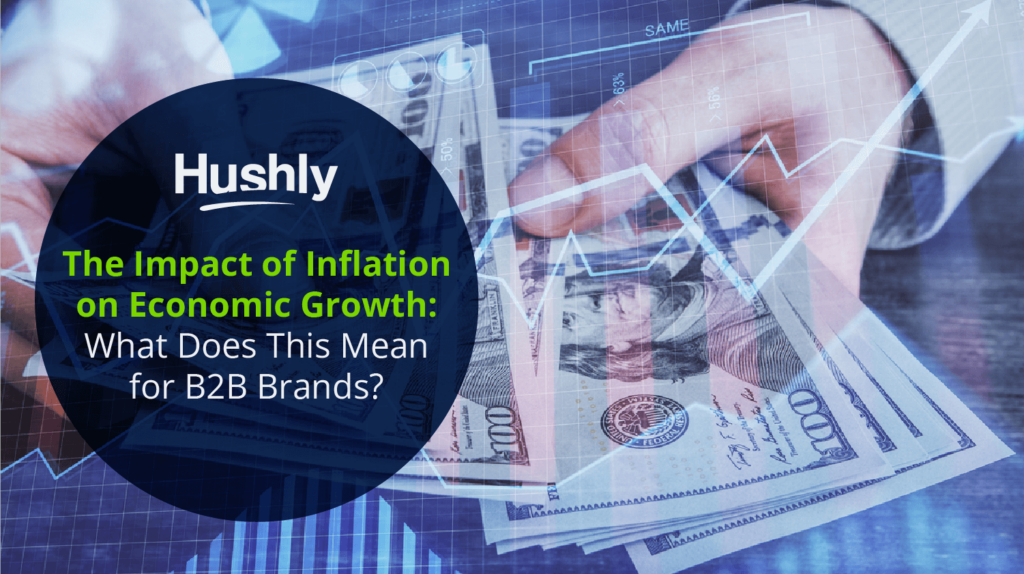Filters
Content Type
Topic
B2B Economic State: What You Need to Know
The current economic state is as tumultuous as ever. The COVID-19 pandemic has forced many businesses to shut their doors, while others have had to scale back their operations over the past couple of years. Meanwhile, you can’t seem to go a day without hearing about supply chain issues or people muttering the word, “inflation,” whether it’s on the news or in the workplace.
To top it off, talks of a recession are on the table. And all of this is creating a lot of stress and obstacles for B2B businesses across the country. Not only are companies facing internal struggles, but their consumers are hesitant to make purchasing decisions, which only continues to hurt sales.
While you may want to tune it all out, you can’t. In fact, you need to familiarize yourself with the current B2B economic state. When you understand what’s going on in the world, you can anticipate how it may impact your business, and you’ll be better prepared to address any challenges as they arise.

Let’s Talk About the Current B2B Economic State
When the economy is in a recession or experiencing slow growth for one reason or another, B2B companies often feel the effects. Today is no exception. Businesses are having a tough go of it in this current B2B economic state. They’re refraining from making large investments and instead are looking for ways to cut costs. Plus, they’re dealing with competitors who are striving to offer the same products and services at a lower rate, making it difficult to stay afloat.
It’s not all doom and gloom though. There are still plenty of opportunities for B2B companies to grow and thrive in this economy. It will require creativity and out-of-the-box thinking to rise above the challenges the world is currently presenting. That’s why it’s so important to be aware of the current B2B economic state so you can make necessary changes to ensure your company’s success.
5 Obstacles B2B Companies Are Facing in This Economy
As the economy continues to shift, it’s only natural that new challenges will arise, creating even more B2B economic struggles. To better prepare your business, here are the obstacles you should be aware of:
1. The Cost of Doing Business Has Gone Up
Inflation and supply chain issues have meant that prices have increased across the board. Odds are, something you use within your business has become more costly recently, and it’s likely throwing your budget out of whack. As a result, it’s becoming more difficult to pay for essentials (rent, office supplies, tools, etc.), and you’re now making the move to cut costs to avoid overspending.
If you’re finding it hard to stay on track financially, use this time to review your budget. Can you continue to spend what you’ve been spending when you consider your current profit margin? It’s absolutely fine if you can’t. This is why you need to be flexible with your budget. If you need to decrease spending, you can then look at where your money is going. Are there any expenses that can be cut? This shift in the B2B economic state could be just what you need to save money now and into the future.
2. Consumers Are More Sensitive to Pricing
With the price of everything going up, you aren’t the only one with higher expenses. Your consumers are feeling the pinch, too. If you’ve noticed that profits have decreased and you have fewer leads coming into your business, it’s probably because people are hesitant to spend. Of course, you aren’t doomed to accept this. If you take the time to learn about the B2B buyer experience, you can implement the latest trends, which might drive the sales you’ve been waiting for.
For example, you may want to focus on providing more content to your consumers to help them advance in the buyer journey. This content can be used to establish trust and ensure they feel more confident when making a purchasing decision. Then, when they see the value of what you have to offer, they may be less likely to question the pricing and won’t feel the need to price shop.
3. It Has Become More Difficult to Stand Out From Competitors
These days, most niches are overly saturated. And to make things more difficult, in this B2B economic state, some businesses have become even more competitive with those in their field. After all, they’re each fighting to obtain the same consumers. As a result, you’re up against some pretty stiff competition. If they’re lowering their prices, you may feel compelled to do the same, so you don’t lose business.
This hurts your bottom line at the end of the day because if you stoop to their level, your profits will decrease. Instead, you should focus on differentiating yourself from your competitors. Emphasize what makes your offering unique so people see the value you have to offer. You can even prioritize creating a personalized website experience that will make your brand more appealing to consumers. It’s all about finding ways to stand out so people don’t hesitate to do business with you.
4. It’s Harder to Find and Retain Qualified Staff
A challenging B2B economic state isn’t the only thing we’re dealing with today. Recent years have led to what’s being dubbed “The Great Resignation.” Many people are leaving their jobs behind, stating they’re not being paid enough, they’re not being treated fairly, or they simply have no opportunities to advance in their present workplace. As a result, companies are struggling to find and retain qualified staff. This means they have fewer people to get jobs done.
Instead of focusing on the tasks that will move the business forward, executives are forced to go back to the drawing board, posting job listings and hosting interviews. It can be stressful and rather discouraging.
To prevent this from happening within your company, it would be wise to take some time to talk with your employees. Figure out if they’re happy within their role. Is there anything they have a problem with? What can you do to make improvements? Simple changes that will keep your employees happy ensure they’ll want to stick around for a long time.
5. Usual Lead Generation Strategies Aren’t Performing
As things change in the world, your business needs to adapt accordingly. And if you find your usual lead generation tactics aren’t working to attract potential customers, it needs to be addressed. Consumers are behaving differently. They’re not necessarily as quick to make purchases as they were before. As mentioned above, they’re also weighing their options and price shopping to find the best deals. This could mean you get overlooked in favor of a competitor.
So, it’s time to figure out what new ways you can attract more leads to your business and get them to convert. Our guide on developing an effective lead conversion strategy will help. For instance, you may want to get clear on your unique selling proposition and ensure you’re communicating that to consumers. You may want to go back to basics and focus on trust-building activities so people will develop a stronger relationship with your business.
Combat B2B Economic Struggles With a Personalized Experience
If you want to put your business in a better position to attract leads despite today’s B2B economic struggles, one of the best practices to implement is personalization. By investing in website personalization, you can tailor your content to a visitor’s unique needs, communicating that you truly understand what they want from you. In turn, you’ll see your conversion rate soar.
You can personalize your content, landing pages, and more so they’ll feel like you’re speaking directly to them. And luckily, that’s exactly what we help our clients do here at Hushly.
If you want to implement B2B website personalization, contact us today to schedule a demo.
The post B2B Economic State: What You Need to Know appeared first on Hushly.



